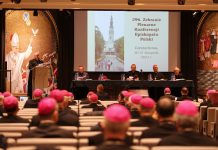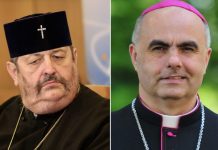The representatives of the Episcopates of Slovakia, Czech Republic, Poland, Hungary, Croatia, Ukraine, Slovenia, Bosnia and Herzegovina, the International Conference of the St. Cyril and Methodius, together with the CCEE Presidency, gathered in Bratislava on September 6 and 7, 2018. The participants in the meeting, in presence of the Apostolic Nuncio in Slovakia, celebrated the Holy Mass in the Cathedral of Saint Martin, presided by Cardinal Angelo Bagnasco, President of the CCEE.
To deal with the different issues concerning the mission of the Church in the current cultural and social circumstances of Central and Eastern Europe, they have discussed the following issues:
In recent years, the dioceses of the region have carried out various actions – such as the collection organized in 2017 for the victims of the wars in the Middle East – and they contribute to the reconstruction of houses, hospitals, schools and entire villages, to make possible the return of the refugees in their homelands. The organs of the Catholic Church have also given valuable assistance to refugees and migrants crossing the territory of their countries.
The countries of Central and Eastern Europe are negatively affected by the exodus of young people. It can not be ignored that the main cause of this phenomenon is that, in course of the last thirty years, the countries of Central and Eastern Europe, despite their adherence to the Western world, have not yet been integrated as equal partners – and the differences in the average wages between the countries of the European West and those of the Central and Eastern Europe have remained enormous. It will therefore be necessary to find a different way of integrating these countries into the Western world: a way that shall guarantee the equal dignity of these countries and their citizens.
The bishops also turn to the governments of their nations, asking them to devote more attention to education reform, as well as to the young people, who often leave the country because of the poor social conditions, looking for work abroad, where they can find better social conditions for marriage and family. The bishops hope that the next synod of bishops on the youth and pastoral care of vocations will bring many useful impulses for the life of the Church.
Society, in which many cede to consumerism, is increasingly confronted with the risk of being unjust to those who – in the spirit of today’s mentality – seem useless, because they are incapable of production. The society can not dispose of its members just because they are not able to deliver performance. The bishops appeal to the public representatives to ensure adequate conditions for those who provide care for the sick, the elderly and people on the periphery of society. Every effort must be made to enable these people to have a worthy life, despite their limitations, and make the society to perceive them as equal members. To improve all these areas, however, it is necessary that the Central and Eastern European countries are treated fairly in the economic relations of the Western world.
Europe has radically changed after the fall of the iron curtain. Freedom regained by the nations of Central and Eastern Europe is a reason for joy. At the same time, the bishops realize that many citizens of their countries experience great uncertainty. The migration crisis has shown that it is not easy to overcome the mental and cultural differences that exist between East and West. The bishops, however, observe that they are obliged to collaborate. It is not possible to be indifferent towards people who – looking for a better future for themselves and their families – find themselves in life-endangering situations or suffer from hunger and famine. We must do everything to help their countries of origin to solve the problems that cause migration.
The bishops are also worried about the spread of gender ideology, concealed also in the well-known Convention of Istanbul. We must do everything to help Europe return to its natural and Christian roots. Its institutions, including the courts, should respect the autonomy of Central and Eastern European countries in the cultural and ethical sphere. The supranational decisions that impose, sometimes indirectly, solutions in contrast to the constitutions and cultures of individual countries, are reason for serious concern, for they deepen the alienations and act against integration. The bishops ask the representatives of governments to refuse the ratification of the Istanbul Protocol, or to revoke the signature.
The Catholic Church has a desire to contribute to European integration and to alleviate social tension. Recalling the words of Pope Francis that “God is far from evil, but close to those who suffer,” (Homily, Holy Mass in Carpi, 2 April, 2017) the bishops pray for everyone who is in difficulties, and always want to help those in need.
CCEE

 Polski
Polski







